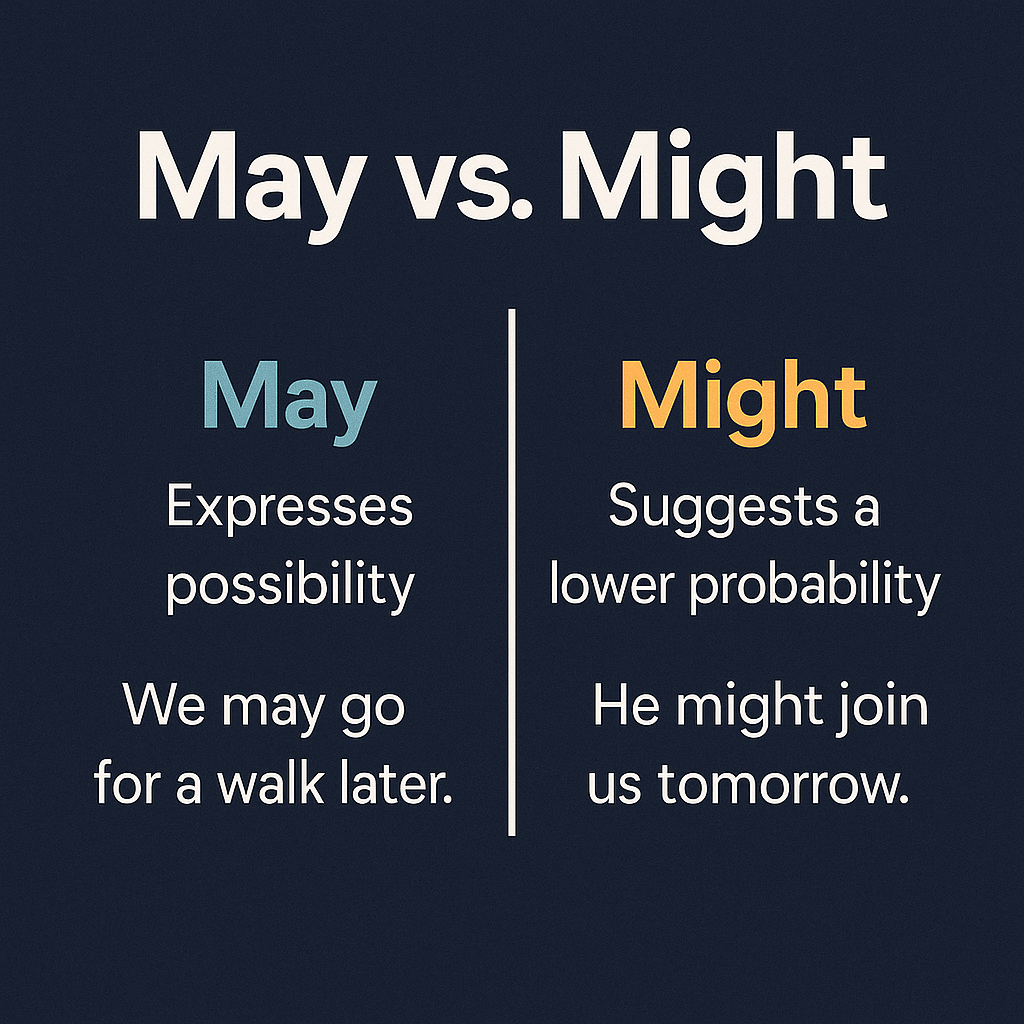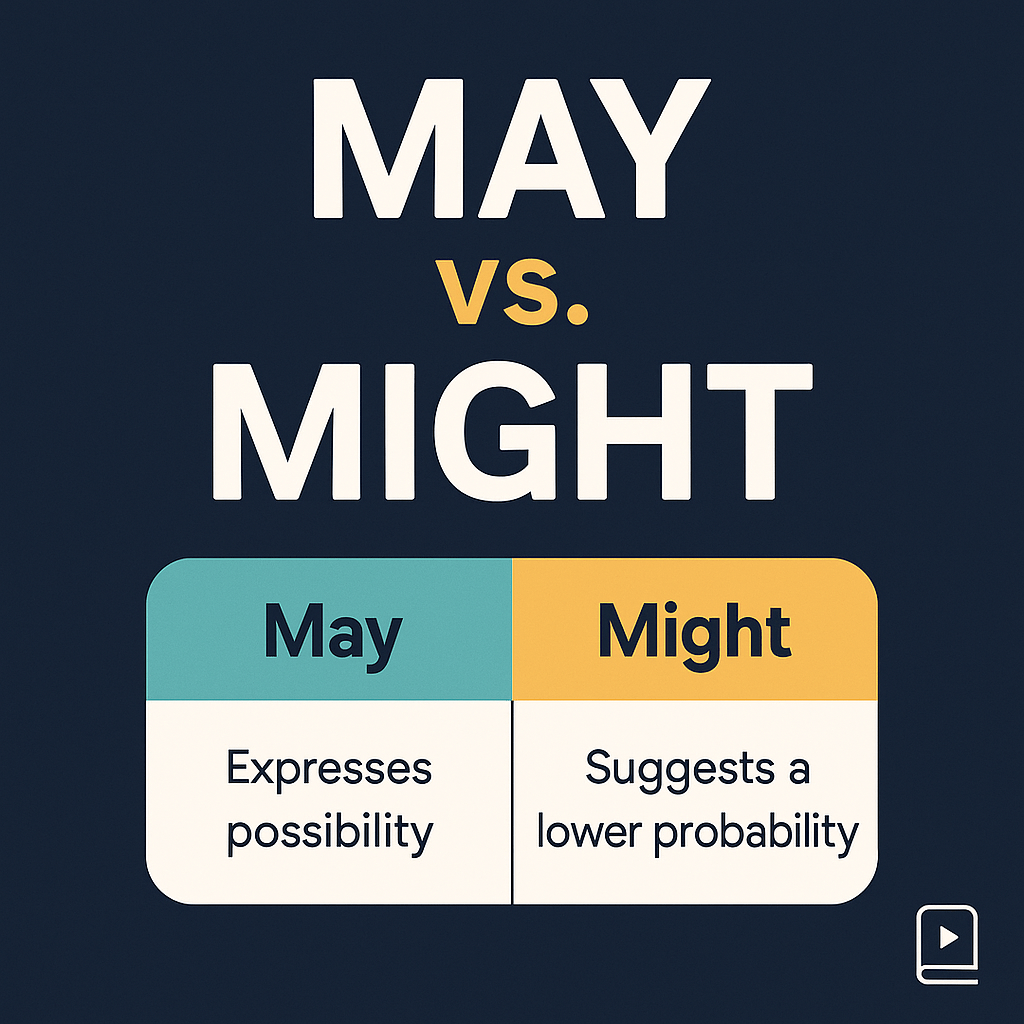English can be a tricky language, especially when it comes to words that seem almost interchangeable. One such confusing pair is “may vs might.” While they both express possibility, there’s a subtle difference in how and when to use them. Let’s break it down in a way that’s clear, simple, and practical—so you never second-guess yourself again.
Table of Contents
What’s the Difference Between May and Might?
At their core, both may and might talk about the possibility of something happening. The difference lies in how strong that possibility is or whether you’re speaking in the past or present/future.
✅ Use “May” When the Possibility Is Strong or Current
May is typically used when the chance of something happening is more likely or when you’re talking about something in the present or future.
Examples:
- I may go to the bookstore after work.
- She may join us for dinner tonight.
These sentences suggest a real possibility, one that could easily happen.
For a detailed breakdown, you can also refer to this Writing Explained’s guide on “may vs might”.
✅ Use “Might” When the Possibility Is Less Likely or Hypothetical
Might often suggests a weaker possibility, or it’s used when you’re being more cautious or uncertain. It’s also more common when discussing the past.
Examples:
- I might go for a walk later, if it doesn’t rain.
- He might have missed the train because of the traffic.
Present vs Past Usage
Here’s where many learners stumble. The key is this:
- Use may or might for present/future possibilities:
- I may go to the event.
- He might call you later.
- Use might have + past participle for past possibilities:
- She might have forgotten the meeting.
- We might have lost the keys at the park.
⚠️ Important: Although some people use may have for past, most native speakers prefer might have, especially in conversational English. Grammarly also supports this rule, noting that “might have” is more idiomatic in everyday speech.

Is “May” More Formal Than “Might”?
Yes, often. May is slightly more formal and is commonly used in professional or polite contexts.
Example:
- You may leave early today, if you finish your work. (Formal)
- You might want to double-check that report. (More casual)
Common Expressions Using May and Might
Here are a few idiomatic phrases to help reinforce usage:
| Expression | Example |
|---|---|
| May I…? (permission) | May I borrow your pen? |
| Might as well (suggestion) | We might as well start without him. |
| May the best man win | Used before a competition begins |
📌 Want more grammar breakdowns like this one? Check out our post on There, Their, and They’re—another confusing trio you’ll finally get right!
May vs Might – Quick Reference Table
| Situation | Use “May” | Use “Might” |
|---|---|---|
| Present/future possibility | I may visit grandma today. | I might visit if I finish work. |
| Past possibility | 🚫 (less common) | I might have left it at the café. |
| Formal tone | You may proceed. | 🚫 |
| Hypothetical/unlikely | 🚫 | That might happen someday. |
FAQs About “May vs Might”
Can I use “may” and “might” interchangeably?
Not always. While they’re sometimes interchangeable in casual contexts, “may” sounds more likely and formal, while “might” expresses uncertainty or refers to past possibilities.Is it wrong to say “may have” in the past?
Technically, it’s acceptable, but native speakers overwhelmingly prefer “might have” when talking about the past.Which is more polite: “may” or “might”?
“May” is often used for polite permission (_May I help you?_), while “might” is more common in casual conversation when making suggestions.Can “might” mean permission?
No. Only “may” is used to ask or give permission.Final Thoughts
While both “may” and “might” help express possibility, knowing when to use each can sharpen your communication and make your writing sound more polished. The next time you’re writing or speaking, pause and think—is this likely, hypothetical, or in the past? That one question will help you decide whether it’s “may” or “might.”
For more grammar tips, head over to FluentGrammar.com and explore our other helpful guides.

